小升初陈述句变一般疑问句
陈述句变一般疑问句和肯定句变否定句的几点技巧
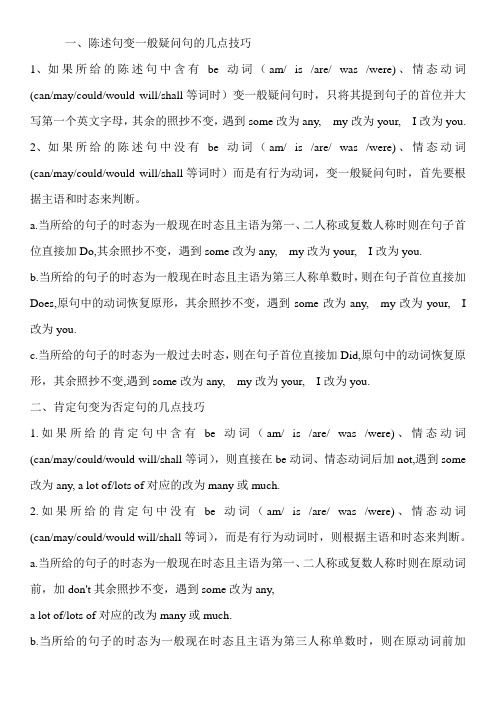
一、陈述句变一般疑问句的几点技巧1、如果所给的陈述句中含有be动词(am/ is /are/ was /were)、情态动词(can/may/could/would will/shall等词时)变一般疑问句时,只将其提到句子的首位并大写第一个英文字母,其余的照抄不变,遇到some改为any, my改为your, I改为you.2、如果所给的陈述句中没有be动词(am/ is /are/ was /were)、情态动词(can/may/could/would will/shall等词时)而是有行为动词,变一般疑问句时,首先要根据主语和时态来判断。
a.当所给的句子的时态为一般现在时态且主语为第一、二人称或复数人称时则在句子首位直接加Do,其余照抄不变,遇到some改为any, my改为your, I改为you.b.当所给的句子的时态为一般现在时态且主语为第三人称单数时,则在句子首位直接加Does,原句中的动词恢复原形,其余照抄不变,遇到some改为any, my改为your, I 改为you.c.当所给的句子的时态为一般过去时态,则在句子首位直接加Did,原句中的动词恢复原形,其余照抄不变,遇到some改为any, my改为your, I改为you.二、肯定句变为否定句的几点技巧1.如果所给的肯定句中含有be动词(am/ is /are/ was /were)、情态动词(can/may/could/would will/shall等词),则直接在be动词、情态动词后加not,遇到some 改为any, a lot of/lots of对应的改为many或much.2.如果所给的肯定句中没有be动词(am/ is /are/ was /were)、情态动词(can/may/could/would will/shall等词),而是有行为动词时,则根据主语和时态来判断。
a.当所给的句子的时态为一般现在时态且主语为第一、二人称或复数人称时则在原动词前,加don't其余照抄不变,遇到some改为any,a lot of/lots of对应的改为many或much.b.当所给的句子的时态为一般现在时态且主语为第三人称单数时,则在原动词前加doesn't原句中的动词恢复原形,其余照抄不变,遇到some改为any,a lot of/lots of对应的改为many或much.c.当所给的句子的时态为一般过去时态,则在原动词前加didn't原句中的动词恢复原形,其余照抄不变,遇到some改为any,a lot of/lots of对应的改为many或much.将下列句子变为一般疑问句和否定句1. His father is an English teacher.2. These cats are crying.3. They can swim.4. I like to read English.5. I go to school on foot.6. He likes English.7. His father goes to work by bus.8. He is crying under the tree.9. His birthday is on the twentieth of November.10. Mrs. Li and Kitty are in a big shop.11. Kitty is wearing her new uniform.12. The boy under the tree is hungry.13. He goes to school every day.14. I want to have a model car.15.She wants a cup of coffee.16. Mrs. Li and Kitty watch television at night.17. I do my homework after school.。
变一般疑问句详细讲解

一、如何变一般疑问句:1. 首先找BE动词(am, is, are, was, were),把它提到句首。
如果句中有some, 要改为any。
2. 如果没有BE动词,就找can,will, must, may等情态动词, 把它提到句首。
如果句中有some, 要改为any。
3. 如果没有情态动词,就加do, does帮助构成疑问句。
如果主语是单数第三人称,就用does 帮助构成疑问句,把它放到句首, 原来的动词改为原型。
如果句中有some, 要改为any。
如果主语不是单数第三人称,就用do帮助构成疑问句, 把它放到句首,。
原来的动词不变。
如果句中有some, 要改为any。
4. 如果句子是一般过去时,要加did帮助构成疑问句一般疑问句的基本用法及结构一般疑问句用于对某一情况提出疑问,通常可用yes和no来回答,读时用升调。
其基本结构是“be / have / 助动词+主语+谓语(表语)”:Is he interested in going?他有兴趣去吗?Have you ever been to Japan?你到过日本吗?Does she often have colds?她常常感冒吗?Did you ask her which to buy?你问没问她该买哪一个?二、陈述句变一般疑问句的方法1. 动词be的疑问式:动词be根据不同的时态和人称可以有am,is,are,was,were 等不同形式,可用作连系动词(表示“是”、“在”等)和助动词(用于构成进行时态和被动语态等),但不管何种情况,构成疑问式时,一律将动词be的适当形式置于句首:Am I right?我是对的吗?Are you feeling better today?你今天感到好些了吗?Was he late for school?他上学迟到了吗?2. 动词have的疑问式:动词have根据不同的时态和人称可以有have,has,had等形式,可以用作实意动词和助动词,分以下情况讨论:①用作实意动词表示状态,如表示拥有、患病或用于have to表示“必须”等,在构成构成式时可以直接将have,has,had置于句首,也可根据情况在句首使用do,does,did:Does he have [Has he] anything to say?他有什么话要说吗?Did you have [Had you] any friends then?他当时有朋友吗?②用作实意动词表示动作,如表示“吃(=eat)”、“喝(=drink)”、“拿(=take)”、“收到(=receive)”、“度过(=spend)”等,构成疑问式时不能将have提前至句首,而应在句首使用do,does,did:Does he have breakfast at home?他在家吃早餐吗?Did you have a good time at the party?你在晚会上玩得高兴吗?③用作助动词构成完成时态,其疑问式总是将have等置于句首:Have you finished your work?你的工作做完了吗?Has he left when you arrived?你到达时他已离开了吗?3. 情态动词的疑问式:情态动词的疑问式通常是将情态动词置于句首:Can you speak English?你会说英语吗?Must I finish the work at once?我必须马上完成工作吗?4. 实意动词的疑问式:一般实意动词的疑问式,通常应根据不同时态和人称在句首加助动词do,does,did等:Do you go to school every day?你每天都上学吗?Does the boy like dancing?这男孩喜欢唱歌吗?Did you see the film last night?你昨晚看了这部电影吗?二、特殊疑问句以疑问词开头,对句中某一成分提问的句子叫特殊疑问句。
小升初英语专题训练将下列陈述句变成一般疑问句

小升初英语专题训练将下列陈述句变成一般疑问句1. His father is an English teacher.2. These cats are crying.3. They can swim.4. I like to read English.5. I go to school on foot.6. He likes English.7. His father goes to work by bus.8. He is crying under the tree.9. His birthday is on the twentieth of November.10. Mrs. Li and Kitty are in a big shop.11. Kitty is wearing her new uniform.12. The boy under the tree is hungry.13. He goes to school every day.15. I want to have a model car.16. She wants a cup of coffee.17. Mrs. Li and Kitty watch television at night.18. I do my homework after school19. It is a lovely dog.20. She is lovely girl.21. He is my father.22. They are Lily’s cousins.23. We are classmates.24. I am a doctor.25. There is a bird in the tree.26. There are many stars in the sky.27. They are good friends.28. I love my parents.29. I play computer games every night.30. There are many books on the shelf.31. There is an ostrich in the zoo.32. We have a pleasant home.33. We like to climb the mountain.34. They go to church on Sunday.35. They walk to school every morning.36. It is a beautiful park.37. It is a big map.38. You are a singer.39. I am listening to music.40. Mike is a student.41. Sarah can clean the classroom.42. They are in the zoo.43. There are some flowers in the vase.44. This is my sister.45. We are sweeping the floor.46. We need some masks.47. They like making the puppet.58. Su Hai and Su Yang live in a new house.49. I put a book on my head.50. They sing “In the classroom ”together.。
英语中陈述句改为一般疑问句的方法

英语中陈述句改为一般疑问句的方法英语中,将陈述句改为一般疑问句有以下几种方法。
请注意,以下解释会用到一些专业术语,但我会尽量用简单易懂的语言解释。
1. 使用助动词do/does/did:在一般疑问句中,我们通常在句首加上助动词do/does/did。
这个助动词需要根据主语的人称和时态进行变化。
例如:陈述句:She sings well.一般疑问句:Does she sing well?这里,我们在句首加上了助动词does,使陈述句变成了一般疑问句。
2. 助动词的位置调换:在某些情况下,我们可以将助动词的位置与主语调换。
例如:陈述句:He is a doctor.一般疑问句:Is he a doctor?这里,我们将助动词is与主语he的位置调换,从而将陈述句改为一般疑问句。
3. 使用疑问词:有时候,我们可以在一般疑问句中使用疑问词来引导问题。
这些疑问词包括who, what, when, where, why, how等。
例如:陈述句:She went to the park.一般疑问句:Where did she go?这里,我们使用了疑问词where来引导问题,从而改变了陈述句的语序。
4. 使用倒装语序:在某些特殊情况下,我们可以使用倒装语序来构成一般疑问句。
具体来说,就是将助动词放在主语之前。
例如:陈述句:You have finished the work.一般疑问句:Have you finished the work?这里,我们将助动词have放在主语you之前,实现了倒装语序。
需要注意的是,这些方法可以单独使用,也可以结合使用,具体取决于句子的结构和语境。
同时,不同的时态和人称也会对这些方法产生影响。
总之,将陈述句改为一般疑问句可以通过加助动词、调换助动词位置、使用疑问词或倒装语序来实现。
这些方法在英语中非常常见,帮助我们构造问句并进行有效的交流。
陈述句变一般疑问句的方法
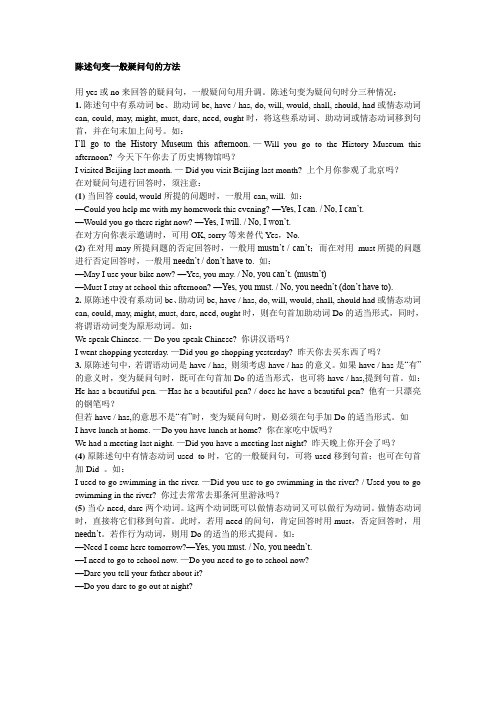
陈述句变一般疑问句的方法用yes或no来回答的疑问句,一般疑问句用升调。
陈述句变为疑问句时分三种情况:1.陈述句中有系动词be、助动词be, have / has, do, will, would, shall, should, had或情态动词can, could, may, might, must, dare, need, ought时,将这些系动词、助动词或情态动词移到句首,并在句末加上问号。
如:I’ll go to the History Museum this afternoon.— Will you go to the History Museum this afternoon? 今天下午你去了历史博物馆吗?I visited Beijing last month. — Did you visit Beijing last month? 上个月你参观了北京吗?在对疑问句进行回答时,须注意:(1)当回答could, would所提的问题时,一般用can, will. 如:—Could you help me with my homework this evening? —Y es, I can. / No, I can’t.—Would you go there right now? —Yes, I will. / No, I won’t.在对方向你表示邀请时,可用OK, sorry等来替代Yes,No.(2)在对用may所提问题的否定回答时,一般用mustn’t / can’t;而在对用must所提的问题进行否定回答时,一般用needn’t / don’t have to. 如:—May I use your bike now? —Yes, you may. / No, you can’t. (mustn’t)—Must I stay at school this afternoon? —Yes, you must. / No, you needn’t (don’t have to).2.原陈述中没有系动词be、助动词be, have / has, do, will, would, shall, should had或情态动词can, could, may, might, must, dare, need, ought时,则在句首加助动词Do的适当形式,同时,将谓语动词变为原形动词。
陈述句改一般疑问句
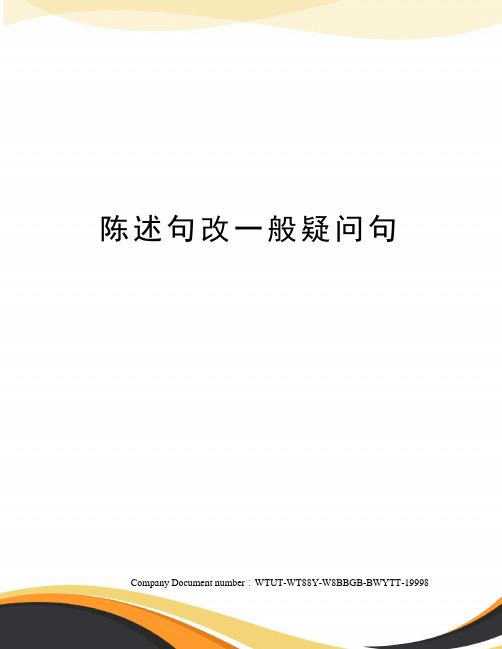
陈述句改一般疑问句Company Document number:WTUT-WT88Y-W8BBGB-BWYTT-199981、陈述句改一般疑问句(1)句子中有be动词(am、is、are、was、were)、情态动词(can、would、may)will时,只要直接把这些词置于句首,句末改成问号;例句:He is a student(他是一个学生)改成一般疑问句就是 Is he a student(他是一个学生吗)(2)如果没有be动词和情态动词,则要用助动词Do或Does、did来帮助例句:she speaks English very well(她英语说得很好)改成一般疑问句Does she speak English very well(她英语说得很好吗)选择好助动词后就可以把原句跟上去,注意的是后面的动词要用原形,如例句中的speak。
2、陈述句改否定句(1)Be动词后加not。
如 is not,are not,am not,was not,were not;(2)在can、should、will后加not。
如can not,should not,will not;(3)上述都没有的,在动词前加助动词否定形式don’t、doesn’t、didn’t;(4)Some改成any例句:she is watching TV now(她现在在看电视)改为 She isn't watching TV nowHe does well in Maths(他的数学很好)改成He doesn't well in Maths(他的数学不好)3、否定句改一般疑问句(1)句子中有be动词的,把be动词提前,其他成分照抄,句末变问号(2)句子中有实义动词的,要使用助动词开头,句中的实义动词变回原形,其他成分照抄,句末变问号(3)句中有情态动词的,把情态动词提前,其他成分照抄,句末变问号例句:He didn’t find his pen under his desk(他没有在他的桌子下面找到他的笔)改成Did he find his pen under his deskWe don’t do eye exercises every day(我们每天不做眼保健操)改成Do you do eye exercises every dayThis problem can not be solved(这个问题不可以解决)改成Can this problem be solved4、一般疑问句用否定句回答含be动词或情态动词的一般疑问句否定回答用:No,主语+be/情态动词+not例句:问句:Are these your English books(这些是你的英语书吗)否定回答:No,they aren’t含行为动词或实义动词的一般疑问句否定回答用“No,主语+do not/does not例句:问句:Do your parents like English(你的父母喜欢英语吗)否定回答:No, they don’t。
小学英语语法:陈述句变一般疑问句
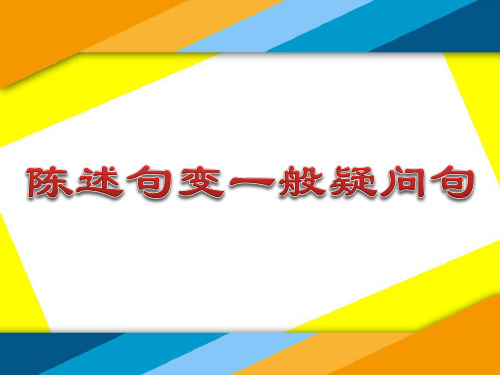
Yes, he is.
No, he isn’t.否定回答
肯定句 They are kind. I am helpful.
一般疑问句 Are they kind?
肯定回答: Yes, 否定回答:
they are.
No, they aren’t. Yes, I am.
Are you helpful?
No, I am not.
Step4:
肯定句
1. I like singing. 2. We like reading.
一般疑问句 肯回,否回 ______________ ______________
3. They like fish.
______________
4. Jerry and Mary like ____________ meat.
一般疑问句
如果有人问你,你今年是九岁吗,你会 怎么回答? 你一定会说,是或者不是。 这种只回答“是”或者“不是”的 问句,在英语就叫做一般疑问句。
陈述句变一般疑问句,要分几种 情况?
1)含有is, am ,are 2)含有情态动词can,must,should
3)含有实意动词
1)含有is, am ,are的陈变一
归 纳:
肯定句 一般疑问句句
1.be动词 2.can
3.like
把be动词提前 把can 提前
把助动词do提前
More practice
1. 2. 3. 4. 5. 6. 7. 8. 9. I am in Pudong. ________________ We are hungry. ________________ That’s an umbrella. _______________ My sisters are playing. ______________ Peter can hear a ship. ________________ We can see a fast train. ________________ I like strawberries. ________________ We like flying kites. _________________ They like swimming together. ________________
陈述句改为一般疑问句和否定句
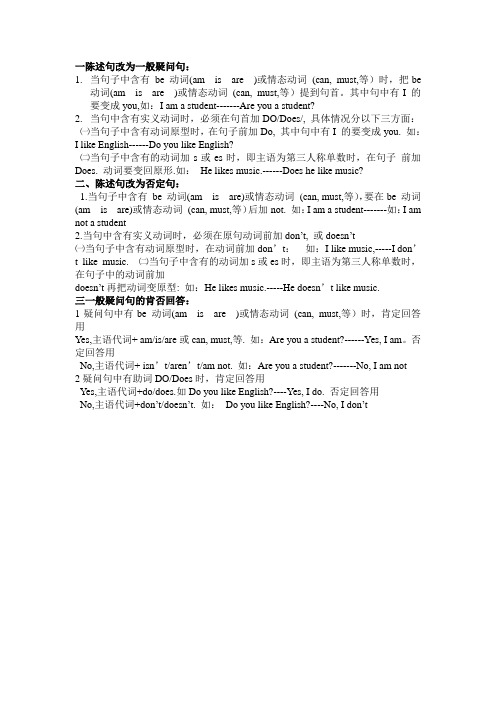
一陈述句改为一般疑问句:1.当句子中含有be 动词(am is are )或情态动词(can, must,等)时,把be动词(am is are )或情态动词(can, must,等)提到句首。
其中句中有I 的要变成you,如:I am a student-------Are you a student?2.当句中含有实义动词时,必须在句首加DO/Does/, 具体情况分以下三方面:㈠当句子中含有动词原型时,在句子前加Do, 其中句中有I 的要变成you. 如:I like English------Do you like English?㈡当句子中含有的动词加s或es时,即主语为第三人称单数时,在句子前加Does. 动词要变回原形.如:He likes music.------Does he like music?二、陈述句改为否定句:1.当句子中含有be 动词(am is are)或情态动词(can, must,等),要在be 动词(am is are)或情态动词(can, must,等)后加not. 如:I am a student-------如:I am not a student2.当句中含有实义动词时,必须在原句动词前加don’t, 或doesn’t㈠当句子中含有动词原型时,在动词前加don’t:如:I like music,-----I don’t like music. ㈡当句子中含有的动词加s或es时,即主语为第三人称单数时,在句子中的动词前加doesn’t再把动词变原型: 如:He likes music.-----He doesn’t like music.三一般疑问句的肯否回答:1疑问句中有be 动词(am is are )或情态动词(can, must,等)时,肯定回答用Yes,主语代词+ am/is/are或can, must,等. 如:Are you a student?------Yes, I am。
(完整版)陈述句变成一般疑问句
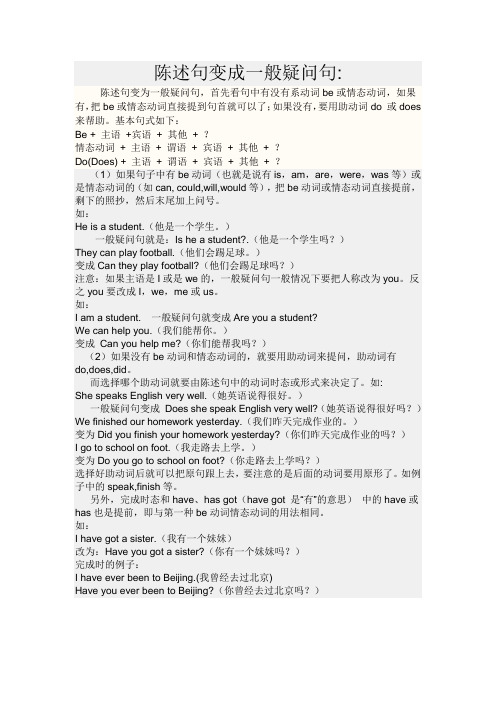
陈述句变成一般疑问句:陈述句变为一般疑问句,首先看句中有没有系动词be或情态动词,如果有,把be或情态动词直接提到句首就可以了;如果没有,要用助动词do 或does 来帮助。
基本句式如下:Be + 主语+宾语+ 其他+ ?情态动词+ 主语+ 谓语+ 宾语+ 其他+ ?Do(Does) + 主语+ 谓语+ 宾语+ 其他+ ?(1)如果句子中有be动词(也就是说有is,am,are,were,was等)或是情态动词的(如can, could,will,would等),把be动词或情态动词直接提前,剩下的照抄,然后末尾加上问号。
如:He is a student.(他是一个学生。
)一般疑问句就是:Is he a student?.(他是一个学生吗?)They can play football.(他们会踢足球。
)变成Can they play football?(他们会踢足球吗?)注意:如果主语是I或是we的,一般疑问句一般情况下要把人称改为you。
反之you要改成I,we,me或us。
如:I am a student. 一般疑问句就变成Are you a student?We can help you.(我们能帮你。
)变成Can you help me?(你们能帮我吗?)(2)如果没有be动词和情态动词的,就要用助动词来提问,助动词有do,does,did。
而选择哪个助动词就要由陈述句中的动词时态或形式来决定了。
如:She speaks English very well.(她英语说得很好。
)一般疑问句变成Does she speak English very well?(她英语说得很好吗?)We finished our homework yesterday.(我们昨天完成作业的。
)变为Did you finish your homework yesterday?(你们昨天完成作业的吗?)I go to school on foot.(我走路去上学。
陈述句变一般疑问句
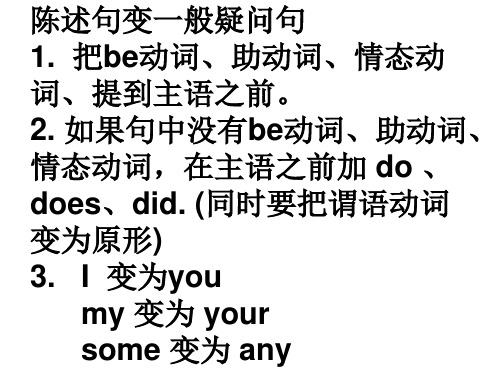
• He is a teacher.
Is he a teacher? They are at school.
Are they at school?
My mother is in red. Is your mother in red?
I can go there. He can swim. You must do it now. She can do it by herself. He is a teacher. They are at school. She is fat My mother is in red. I go there by bus. He does his homework. Henry takes the No.1 bus to school. The panda looks lovely.
• They are at school. • She is fat.
Are they at school?
• My mother is in red. • I must go there. • He can swim.
Is she fat?
Is your mother in red? Must you go there? Can he swim?
陈述句变一般疑问句 1. 把be动词、助动词、情态动 词、提到主语之前。 2. 如果句中没有be动词、助动词、 情态动词,在主语之前加 do 、 does、did. (同时要把谓语动词 变为原形) 3. I 变为you my 变为 your some 变为 any
be动词:am、is、are、 was、 were 助动词:do、does、did 等 情态动词:can、must、 will、 could、would、 may等
怎样将陈述句改为一般疑问句

怎样将陈述句改为一般疑问句
陈述句改为一般疑问句时,需要注意以下两点:
1.当陈述句的谓语动词是实义动词,谓语动词是一般现在时时,要在主语前加Do或Does,如谓语动词是一般过去时,在主语前加Did。
注意:将陈述句变为一般疑问句以后,谓语动词都要用动词原形。
如:
I often go to school on foot →Do you often go to school on foot?
They love sports. → Do they love sports?
He often gets up at six in the morning. →Does he often get up at six in the morning?
Tom went to the park by bike. →Did Tom go to the park by bike?
2.当陈述句的谓语动词含有系动词am, is, are, was, were,情态动词can,may, must,should或助动词will,shall, have, has, had时,将这些词移到主语之前并大写。
如:
Jack is my best friend. → Is Jack your best friend?
They boys were smiling. →Were the boys smiling?
The girl can speak English . →Can the girl speak English?
He has finished his work.→ Has he finished his work?。
陈述句变一般疑问句

陈述句变一般疑问句(人称是第一人称时,要变成第二人称)1. 陈述句中有be动词时,把be动词提到主语前面,将句号变成问号。
I am a student. → Are you a student ?She is a girl. →Is she a girl ?2. 陈述句中有情态动词时,把情态动词提到主语前面,将句号变成问号。
I can swim. → Can you swim ?They will go to school next month. →Will they go to school next month?3. 陈述句中有实意动词时,我们要借助助动词来帮助提问,动词要变成原形①当句中动词是原形时,我要借助do来提问They like playing the piano.→Do they like playing the piano?We have a great time at school. → Do we have a great time at school?②当句子中动词是第三人称单数时,我们要借助助动词does来提问,动词要变成原形She waters the plants every day.→ Does she water the plants every day?He goes to school five times a week.→ Does he go to school five times a week?She does her housework every day.→ Does she do her housework every day?③当句子中动词时过去式时,我们要借助助动词did来提问,动词要变成原形We watched TV last night.→ Did we watch TV last night?They enjoyed theirselves at the party.→ Did they enjoy theirselves at the party?当句子中有some,要把some变成any。
句型转换(陈述句变一般疑问句特殊疑问句及练习)
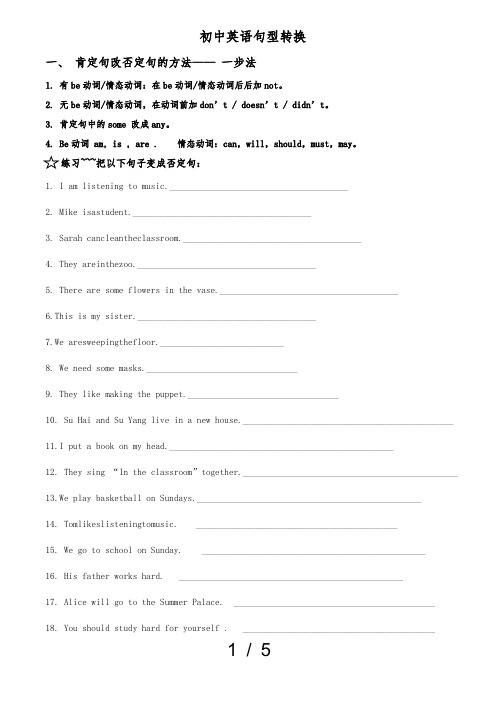
初中英语句型转换一、肯定句改否定句的方法——一步法1. 有be动词/情态动词:在be动词/情态动词后后加not。
2. 无be动词/情态动词,在动词前加don’t / doesn’t / didn’t。
3. 肯定句中的some 改成any。
4. Be动词 am, is , are . 情态动词:can,will,should,must,may。
练习~~~把以下句子变成否定句:1. I am listening to music._______________________________________2. Mike isastudent._______________________________________3. Sarah cancleantheclassroom._______________________________________4. They areinthezoo._______________________________________5. There are some flowers in the vase._______________________________________6.This is my sister._______________________________________7.We aresweepingthefloor.___________________________8. We need some masks._________________________________9. They like making the puppet._________________________________10. Su Hai and Su Yang live in a new house.______________________________________________11.I put a book on my head._________________________________________________12. They sing “In the classroom”together._______________________________________________13.We play basketball on Sundays._________________________________________________14. Tomlikeslisteningtomusic. ____________________________________________15. We go to school on Sunday. _________________________________________________16. His father works hard. _________________________________________________17. Alice will go to the Summer Palace. ____________________________________________18. You should study hard for yourself . __________________________________________1. 有be动词/情态动词:be动词/情态动词提到句首,其余照抄,(some改any,my改your)句末用问号。
2014小升初英语专题句型转换对划线部分提问
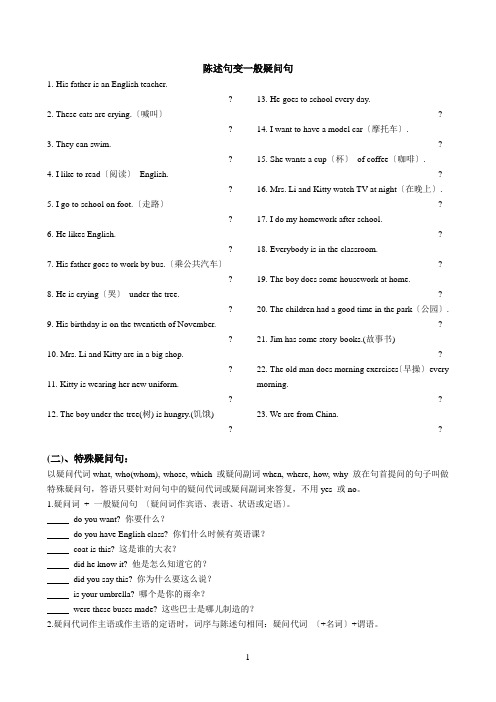
陈述句变一般疑问句1.His father is an English teacher._________________________________________ ?2. These cats are crying.〔喊叫〕_________________________________________ ?3. They can swim._________________________________________ ?4. I like to read〔阅读〕English._________________________________________ ?5. I go to school on foot.〔走路〕_________________________________________ ?6. He likes English._________________________________________ ?7. His father goes to work by bus.〔乘公共汽车〕_________________________________________ ?8. He is crying〔哭〕under the tree._________________________________________ ?9. His birthday is on the twentieth of November._________________________________________ ?10. Mrs. Li and Kitty are in a big shop._________________________________________ ?11. Kitty is wearing her new uniform._________________________________________ ?12. The boy under the tree(树) is hungry.(饥饿)_________________________________________ ? 13. He goes to school every day._________________________________________ ?14. I want to have a model car〔摩托车〕._________________________________________ ?15. She wants a cup〔杯〕of coffee〔咖啡〕._________________________________________ ?16. Mrs. Li and Kitty watch TV at night〔在晚上〕. _________________________________________ ?17. I do my homework after school._________________________________________ ?18. Everybody is in the classroom._________________________________________ ?19. The boy does some housework at home._________________________________________ ?20. The children had a good time in the park〔公园〕. _________________________________________ ?21. Jim has some story-books.(故事书)_________________________________________ ?22. The old man does morning exercises〔早操〕every morning._________________________________________ ?23. We are from China._________________________________________ ?疑问句专项练习按要求改写句子,每空格限填一词。
陈述句变一般疑问句的方法
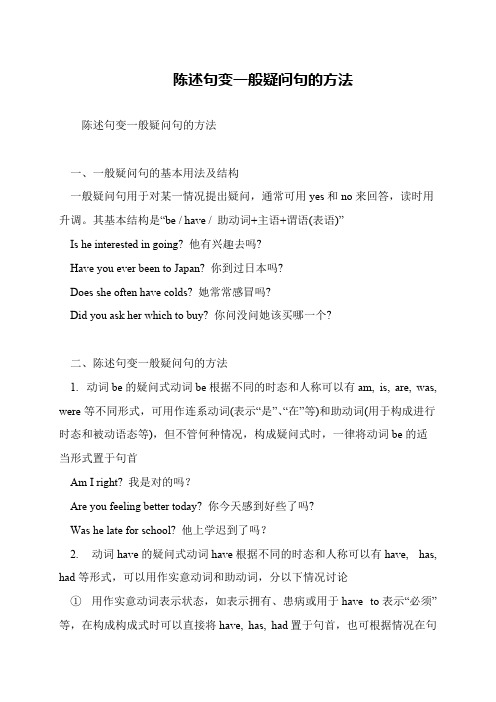
陈述句变一般疑问句的方法
陈述句变一般疑问句的方法
一、一般疑问句的基本用法及结构
一般疑问句用于对某一情况提出疑问,通常可用yes和no来回答,读时用升调。
其基本结构是“be / have / 助动词+主语+谓语(表语)”
Is he interested in going? 他有兴趣去吗?
Have you ever been to Japan? 你到过日本吗?
Does she often have colds? 她常常感冒吗?
Did you ask her which to buy? 你问没问她该买哪一个?
二、陈述句变一般疑问句的方法
1. 动词be的疑问式动词be根据不同的时态和人称可以有am, is, are, was, were等不同形式,可用作连系动词(表示“是”、“在”等)和助动词(用于构成进行时态和被动语态等),但不管何种情况,构成疑问式时,一律将动词be的适当形式置于句首
Am I right? 我是对的吗?
Are you feeling better today? 你今天感到好些了吗?
Was he late for school? 他上学迟到了吗?
2. 动词have的疑问式动词have根据不同的时态和人称可以有have, has, had等形式,可以用作实意动词和助动词,分以下情况讨论
①用作实意动词表示状态,如表示拥有、患病或用于have to表示“必须”等,在构成构成式时可以直接将have, has, had置于句首,也可根据情况在句。
- 1、下载文档前请自行甄别文档内容的完整性,平台不提供额外的编辑、内容补充、找答案等附加服务。
- 2、"仅部分预览"的文档,不可在线预览部分如存在完整性等问题,可反馈申请退款(可完整预览的文档不适用该条件!)。
- 3、如文档侵犯您的权益,请联系客服反馈,我们会尽快为您处理(人工客服工作时间:9:00-18:30)。
1.My name is Tom.(对划线部分提问)
2.She is Alice.(对划线部分提问)
3.His family name is Wang.(对划线部分提问)
4.My little brother goes to school every day.(变一般疑问句)
5.His sister is 6 years old.(对划线部分提问)
6.He lives in China.(对划线部分提问)
7.Jorge is still learning how to scooter.(变一般疑问句)
8.他的姓氏是什么?(汉译英)
9.谁是最后一个到家的?(汉译英)
10.Jim是第一个到学校的。
(汉译英)
11.I usually get up at 6:00.(对划线部分提问)
12.I am fine.(对划线部分提问)
陈述句变一般疑问句的规则:
先判断谓语动词,谓语动词是be动词的,将be动词提前;
谓语动词是实意动词的,借助助动词(do,does,did),将助动词提前,助动词后动词要变为动词原型。
第一人称要变第二人称。
